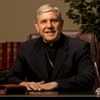
Most Reverend Jerome E. Listecki
Archbishop of Milwaukee
Dear Brothers and Sisters in Christ,
St. John Paul II left a great legacy to our Church. During his pontificate of more than 26 years, he promulgated the Catechism of the Catholic Church and the revision of the Code of Canon Law. He also expanded the social justice teachings of the Catholic Church, gave a basic grounding of moral theology in the encyclical “Veritatis Splendor,” championed pro-life causes, and introduced the Luminous Mysteries of the Rosary.
One decision, however, particularly captured the spiritual imagination of the Church universal: the institution of the Sunday after Easter as Divine Mercy Sunday.
Divine Mercy Sunday has an interesting history that begins in the 1930s. A simple Polish religious nun, Sr. Faustina Kowalska (now St. Faustina), with no sophisticated theological training, received spiritual visions about trusting in the mercy of our Lord and Savior. She was instructed by her spiritual director to record her visions. She was told that the world needed this sign of mercy and would come to know this devotion. She took her recorded works to the Church, but for many years the Church authorities were skeptical and even condemned these personal visions. She died at the young age of 33 never knowing the effect that her work would have on the Universal Church.
Not long after she died, a young Polish seminarian came to know of her writings. He became Fr. Karol Wojtyla, and later, Pope John Paul II. He offered to the Church the devotion of St. Faustina and declared the second Sunday after Easter as Divine Mercy Sunday. This is a celebration of divine peace that is offered to all who place their trust in Jesus especially in the Sacrament of Penance and Reconciliation. Pope Francis preaches the mercy of God and has defined himself as a sinner in need of God’s mercy fully experiencing God’s unconditional love.
St. John Paul II, who himself suffered publicly in the last days of his pontificate, knew that the world needed mercy —mercy that could only be achieved through the love of God and the forgiveness of sins. There should be little doubt in anyone’s mind about the divisions we experience in our world. We do not talk to one another; we shout at one another. We do not share our goods; we accumulate and hoard them. Yet the Acts of the Apostles tells us “The community of believers was of one heart and mind.” How far are we from the Christian spirit?
We live as if Jesus’ suffering, death, and resurrection never happened. If we truly desire to change the world it will come through the admission of sin and mercy extended through reconciliation. It begins with us — we need to confess our sins and open our lives to conversion, transforming ourselves as other Christs. It should be obvious why St. John Paul II declared that the Church and world would be reformed through the two sacraments of the Eucharist and Reconciliation.
I have been at the bedside of those dying who have received great consolation in the recitation of the Divine Mercy Chaplit. Those standing by are entrusting their loved one to the God whose mercy grants forgiveness and the eternal life given to all who believe. I have walked away strengthened in my faith.
There are many who need Divine Mercy. This may be due to personal sin, addictions, pain over separations or loss, an illness and even fear for those facing death.
As we approach Divine Mercy Sunday, realize that whatever is an obstacle for you to embrace the love of Jesus, he is there for you and offers his mercy and forgiveness. The sacrament is there for you. “Jesus, I trust in you.” We pledge to follow His commandments, for as St. John states: “they are not burdensome for whoever is begotten by God conquers the world. And the victory that conquers the world is our faith.” With hearts filled with God’s forgiveness, let us LOVE ONE ANOTHER.
Note: This blog originally appeared as the April 11, 2023, "Love One Another" email sent to Catholics throughout the Archdiocese of Milwaukee by Archbishop Jerome E. Listecki. If you are interested in signing up for these email messages, please click here.